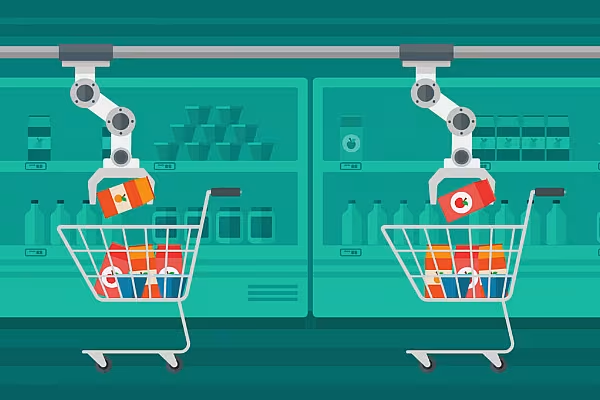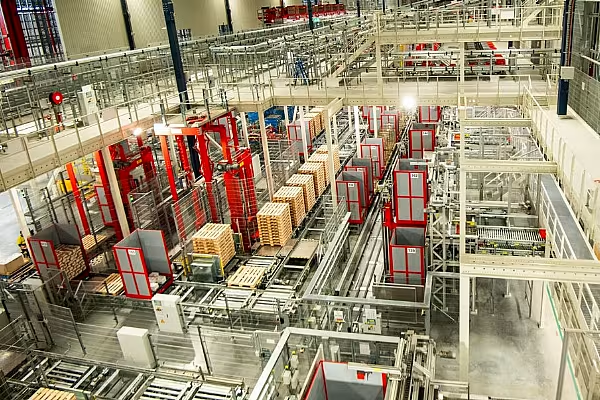What does the rise of AI mean for supermarket buyers and other core functions in the retail business model? Peter Taberner reports. This article first appeared in ESM's March/April 2024 edition.
The influence of artificial intelligence is a growing trend in the grocery space, particularly when it comes to buying functions, in areas ranging from inventory management to pricing, and communicating with customers.
Historical sales data calculations and distribution patterns are examples wherein AI is making huge inroads, changing the role of a supermarket buyer, as AI-driven insight facilitates a better understanding about the relationships between the moving parts of a supermarket business model.
AI has the ability to engineer data which asks broader questions about the business, which goes deeper than just cross-examining data in a rapid way.
‘Significant Investment’
“When it comes to planning and forecasting, there has been significant investment in the past five to six years with AI,” says Laurent Thoumine, retail lead for EMEA at consultancy firm Accenture. “Currently, there are some initiatives where what is forecasted at the store level is forecasted to the suppliers, especially exclusive suppliers – many European supermarket chains are doing this. It empowers them to manage their inventories even more accurately.”
This leads to production batches that are sized against what has been forecast – an illustration of how AI is being leveraged in relation to planning.
Looking at the bigger picture of the supply chain, supermarket buyers can make more efficient decisions on the go, which is a crucial part of the evolution of AI because of the quantity of data available, as the logistical nodes at the end of a supply chain have to be considered.
Thoumine continues, “For example, the cost of orange juice in bulk, which is something that you can monitor on the financial markets, depends on whatever elements enter into account when estimating the potential costs of a product. This can now be modelled by AI to support the buyer in his or her negotiations.
“In the United States, several retailers nowadays are no longer negotiating with suppliers – it is robots who are now doing the negotiating.”
Planning And Preference
Supermarket chains are benefitting from being enabled by AI to restructure and prioritise a wide range of aspects of the business with greater precision. Traditional methods of planning are still being used, such as a process map, from which it can be decided just where AI can have the biggest impact, enabling retailers to optimise their cost base.
Another movement in predictive planning and promoting a better in-store experience focuses on how AI and GenAI are changing the game when it comes to consumer analysis involving language, sentiment, and expression of preference.
AI has a real-time ability to monitor products and services that the consumer regards as unique – and therefore the most relevant to his or her needs – and identify emerging need spaces.
This is all part of the competitive insight of AI, and the methods that supermarkets are using to gain a bigger market share over their rivals. Dynamic pricing strategies have also been driven by the progress in AI technology. Algorithms are used to monitor competitors’ prices and any changes in pricing strategies, using historical sales data in order to adjust prices simultaneously, when necessary, to match the latest demands in the market, to maximise profitability.
Elsewhere, demand forecasting is another way to get ahead, by mining in-depth information from the marketplace. AI can forecast industry changes that enable proactive decisions to be made by supermarket buyers, in areas such as marketing and business strategies.
Optimised Understanding
“Supermarkets know their customers and what they buy. AI-led competitive advantage lies in optimising how they buy it,” says Richard Chamier, data science and strategy expert at PA Consulting. “AI already offers supermarket buyers a well-established value proposition across demand planning, price optimisation and inventory management.”
In other words, supermarkets increasingly know when their customers are likely to buy items next and are “savvy when it comes to optimising pricing models,” Chamier adds. “Gaining competitive advantage means pushing AI horizons towards hyper-personalisation, predictive capabilities, real-time insights, supply chain optimisation, and sustainability – all of which are critical competitive differentiators in an increasingly dynamic market.”
Customer Engagement
Another important aspect of AI development is how supermarket operators use the technology to engage with consumers, gaining insight in the process.
“Vision AI and analytics is augmenting the supermarkets’ understanding of people in the bricks-and-mortar space,” says Chamier. “AI-powered surveillance systems equipped with computer vision technology are helping supermarket buyers get closer to the customers in their store, identifying basic characteristics, browsing habits, gender, age, and dwell time.
“Supermarkets are increasingly using this AI-powered ‘vision data’ to enrich the customer data they already collect, using this to inform adaptive shelf design, personalise in-store promotions, and track conversion from digital advertising to bricks-and-mortar browsing.”
Also, GenAI is bringing an increased personalised dialogue to in-store assistance for supermarkets, as it has revolutionised the ability for humans to ‘talk’ to AI.
GenAI-powered virtual assistants offer the potential for customers to be presented with hyper-personalised shopping recommendations and in-store navigation, specialised meal plans, and recipe recommendations. This is all made available through voice-enabled natural-language dialogue, to revolutionise the in-store shopping experience.
Asda is one supermarket chain that is committed to a focus on AI and developing its use to its own advantage.
According to a spokesperson for the retailer, “As a business, we aim to anticipate and deliver on customer needs. We recognise that AI plays a significant role both now and in the future of q-commerce.
“We have been focusing on personalising customer journeys, optimising pricing strategies, supporting new customer trends and demands, and, longer term, are looking to utilise tools available to enhance the customer experience across our full online portfolio.”
A recent study carried out by Accenture, with 1,500 consumer respondents, found that two thirds are either already using, or would consider using, an AI shopping assistant that recommends other products that pair well with their purchases.
In addition, 55% said that they are already using, or would consider using, an AI shopping assistant that recommends products within their budget.
Change Management
Of course, such a defining shift in the technological base does present huge challenges as retailers operate in general, with the job of buyers and other traditional roles likely to be redefined. The cultural change that AI brings will require an emphasis on change management, wherein key staff members will have to be brought up to speed with AI developments.
While the hype that surrounds Next-Gen AI grows, the implementation of certain initiatives often underestimates the importance of establishing a robust foundation of high-quality data, alongside best-fit architecture and upskilled teams. The obvious potential that AI has to unlock a wide range of benefits for supermarkets remains directly correlated to the quality of data with which such capabilities are presented.
For example, customer engagement with chatbots is likely to change the online shopping experience “dramatically,” according to Accenture’s Thoumine, with AI facilitating a more conversational approach.
“It’s not going to be about presenting a long list of products. It is going to be about what your plan is this week, and then a list will come,” he says. “We have to prepare for this from a back-office perspective.”
This, in turn, will lead to a situation wherein individuals working on product data information may no longer be needed, Thoumine adds, saying, “A proportion of buyers will not be needed, as this part of the process will be taken over by AI, to be completed on an automated basis.”
Times are certainly changing for the supermarket industry.
This article first appeared in ESM's March/April 2024 edition.














